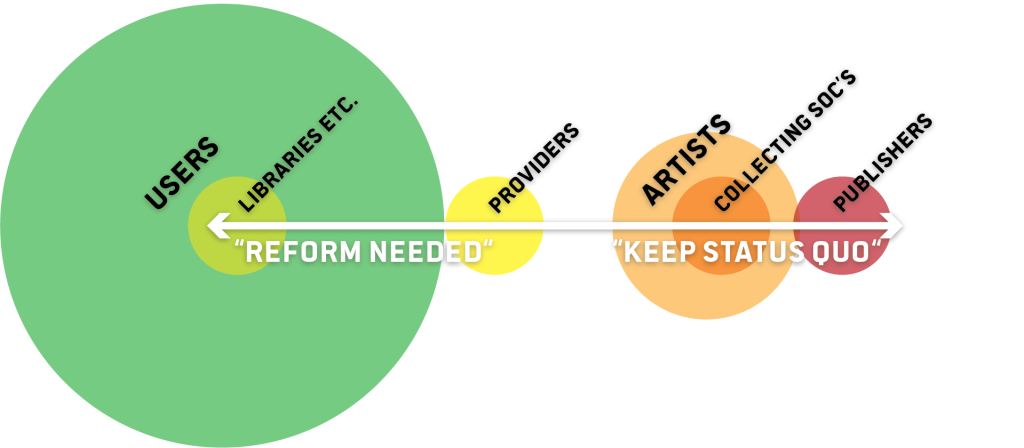Before making laws on complex matters, the European Commission may ask the public for input. Most such consultations get anywhere from dozens to a few hundred replies. They come mostly from the kinds of people who get paid for filling out forms: lobbyists, industry representatives, national governments, etc. But this time was different.
Late last year, the EU started a consultation on copyright reform. Often, you can reply to such consultations online in many languages. This one, however, was conducted in a very user-unfriendly way: A jargon-heavy 80-question document, provided exclusively in English, that people needed to download and fill in. Despite this, responses started flooding in.
To everyone’s surprise, it saw one of the highest rates of participation ever. So many people wanted to have their say that they had to extend the deadline. In the end, over 11,000 people and organizations gave their input.
Why do so many people care?
Some may think copyright is a niche issue, a dry legal matter. But it’s not! It affects many individuals in their daily lives.
That is especially true at the EU level: Increasingly, Europeans’ lives do not stop at national borders – but much of the copyright legislation and licensing does. That causes friction. For Europeans, which country they’re currently in limits access to online content in a way they consider “mostly arbitrary and unpredictable”. And due to differing laws, it might be illegal for you to tweet a photo of a building that you took in France, but legal if you photographed the same building from across the border in Germany.
But there were also other reasons for the number of replies:
Hacking democracy
At least three groups did what the Commission neglected to do and built easy online forms for people to make their voices heard. For example, a group of Pirate Party members broke the 80 legal questions down to everyday scenarios in people’s lives and translated them into 9 languages. (Read the background story…)
Regular people took it upon themselves to make an arcane process meant for political insiders accessible to everybody – artists and consumers alike. Without asking for permission.
The pressing need for an update
When EU copyright legislation was last updated 13 years ago, Facebook and YouTube did not exist. Since then, the world has become as interconnected as never before.
Sharing information is now a big part of everyone’s daily routine: When you find something you like, you share a link to it with your friends. Every $100 phone comes with the tools to create and publish multimedia. Everyone is now also a creator and a distributor.
In many cases, these behaviours are perfectly legal. But some actions we recognise as enriching our culture and lives can conflict with laws written in another age.
Two worlds
These are some reasons many users care about copyright. Collecting societies and publishers, on the other hand, care because their business is built around the current system. The consultation revealed an astonishing rift between these two groups’ views on copyright reform – with service providers and artists caught in the middle.

Click here to explore the differences in more detail, compiled by Leonhard Dobusch.
However, the report suggests that they don’t just disagree on what should be done, but also on facts about the status quo. They might as well live on different planets:
USERS: “The vast majority report facing problems when trying to access online services in another EU country.”
LIBRARIES, UNIVERSITIES, ETC.: “The great majority…consider that further measures are needed to increase…cross-border availability”‘
PRODUCERS: “There is no clear evidence that problems with cross-border access exist in the music sector, including any unsatisfied consumer demand… The vast majority…do not think that measures are needed.”

What users demand
Judging by the EU’s analysis of the responses, these are Europeans’ top 5 demands:
- A single common copyright for Europe that is easier to understand, leads to less cross-border friction and doesn’t constantly expose users to legal uncertainties.
- Shorter copyright protection terms rather than the current period of 70 years after the creator’s death.
- Clearly defined users’ rights for non-commercial use. Quotation, criticism, parody, scientific research, education, libraries – these exceptions to copyright protection must be mandatory across the EU. We need new exceptions for user-generated content (having copyrighted music running in the background of a vlog should not be illegal) and for file sharing between individuals. Publishers should not be able to take away these rights with technical measures.
- The ability to link to content without being made liable for its copyright status, which can be impossible for users to ascertain.
- Future compatibility: The law should not categorically forbid future uses that could not be foreseen at the time of its adoption. Adding an open-ended “fair use” exception would allow courts to weigh future uses on a case-by-case basis.
THE FIGHT FOR COPYRIGHT REFORM BEGINS NOW
In the Fall, the new European Commission will present their white paper for reform. (It has been delayed after internal disagreements.)
The consultation has shown: Europeans feel the pain of the current legal status quo. Even in times of rising Euro-skepticism, they overwhelmingly want an ambitious plan to harmonise copyright across the EU and also update it to meet current challenges.
We need to spread and amplify that message. As a new member of the European Parliament, I will make this my priority. But I need your help.
I take the needs and concerns of artists very seriously. But I also care deeply that we seize the unique opportunities before us: To allow everyone access to culture and participation in it without having to fear the law. To be able to engage with culture in empowered ways – sharing, quoting, learning and building new works on what has come before. Allowing more people to be creators, not just consumers. A copyright that serves society as a whole, not just commercial interests.
These are opportunities that our ancestors wouldn’t have dared to dream possible. It’s time to stop preventing their realisation with thinking that ends at national borders and laws written for a different era.
That’s what I will fight for in the European Parliament.
Will you join me? Sign up for my newsletter and I’ll be in touch. And please spread the word using the share buttons below!
To the extent possible under law, the creator has waived all copyright and related or neighboring rights to this work.



The “two worlds” diagram is a little inaccurate. Copyright holders are generally not the artists, they are either record companies or film studios. Artists generally sign away their rights. That’s a huge problem. Unfortunately the record companies and film studios are doing their best to convince artists that these problems apply to artists, when the truth is that they keep the copyright holders from making their money.
Moin Julia, super Klasse das du Piratin bei der EU vertreten bist!!! Falls Du Unterstützung im Bereich Bildung brauchst, stehe ich Dir gerne mit meinem Wissen und Erfahrung bei.
Vielleicht erinnerte Du Dich, ich bin eine treibende Kraft, des Antrages zur Umwandlung der Schulpflicht in eine Bildungspflicht. Der von der Berliner Piratenpartei angenommen wurde.
Eines meiner Ziele ist es, in Deutschland die Schulpflicht in einen Bildungsauftrag umzuwandeln. Die EU mahnt DLand in Bezug auf die Praktiken des Schulzwangs schon lange an.
Ich kann mir auch vorstellen für dieses Thema bei der EU noch Unterstützung zu bekommen. Wäre super wenn Du mir da weiter helfen könntest.
LG
Nicolay
[…] auch die Anzahl der Rückmeldungen im Rahmen der Konsultation berücksichtigt wird, wie das die deutsche Piratenabgeordnete im EU-Parlament Julia Reda auf Basis meiner Rohdaten getan […]